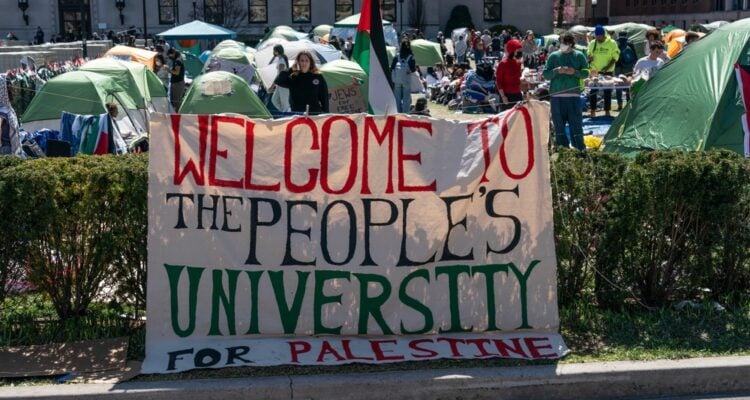|
Getting your Trinity Audio player ready...
|
Bklyn Lawyer with Rap Sheet Indicted in Israeli Flag Burning at Columbia U Protest
Edited by: Fern Sidman
As tensions surrounding the war in Gaza escalated earlier this year, protests surged across New York City, and Columbia University found itself at the center of national attention. What began as demonstrations against the conflict quickly expanded into broader debates about free speech, academic freedom, and the role of outside agitators in campus unrest. According to a report in The New York Times, among those caught in the legal aftermath of these protests was James Carlson, a Brooklyn-based lawyer and activist whose indictment has reignited conversations about the boundaries between peaceful protest and criminal behavior.
On Monday, Manhattan District Attorney Alvin L. Bragg Jr. announced the indictment of Carlson on multiple charges, including arson and criminal mischief, related to his alleged actions during a protest at Columbia University in April. The NYT reported that according to prosecutors, Carlson, who has a long history of activism across various causes, went beyond peaceful protest, igniting an Israeli flag and damaging property, including a surveillance camera. The charges, which could carry up to four years in prison, are the latest development in a series of protests that have shaken the city’s academic institutions.
The protests at Columbia were part of a larger wave of campus demonstrations, many of which led to confrontations with law enforcement and widespread arrests. While some officials argued that much of the unrest was fueled by outside agitators, data shows that a significant number of those arrested had direct affiliations with the universities involved. The report in the NYT noted that at Columbia alone, more than 100 people were detained by police on April 30, and while nearly two-thirds of those had connections to the university, a notable fraction—nine individuals—were outsiders, including Carlson.
Columbia University’s Morningside Heights campus became the epicenter of these protests when activists occupied Hamilton Hall, a historic academic building. Police quickly intervened, arresting approximately 50 individuals. The NYT report said that Carlson, who was among them, now faces charges that have thrust him into the public eye, not only as an activist but as a defendant in a case that highlights the complex nature of protest movements and their legal consequences.
The charges against Carlson, 40, stem from a series of incidents that prosecutors say crossed the line from lawful protest to criminal activity. According to the indictment, Carlson, who is Jewish and known by the nickname Cody, allegedly used a lighter to set an Israeli flag on fire during the demonstration, as per the information provided in the NYT report. This act of arson, prosecutors argue, is a clear departure from peaceful protest. Carlson is also accused of destroying a surveillance camera while in jail and breaking into a university building, which led to additional charges of criminal mischief and trespassing.
“This defendant’s alleged activity went beyond legal and peaceful protest,” District Attorney Bragg said in a statement. “This type of behavior will not be tolerated.”
If convicted, Carlson could face up to four years in prison for the felony arson charge and additional penalties for the three misdemeanor counts.
While the charges against Carlson are serious, this is not the first time he has found himself in legal trouble stemming from his activism. A New York Times review of police records revealed that Carlson has a history of involvement in protests, with legal entanglements that span multiple causes and regions. His activism has touched on a wide variety of issues, from Black Lives Matter and immigration policy to animal rights and anti-globalization movements.





